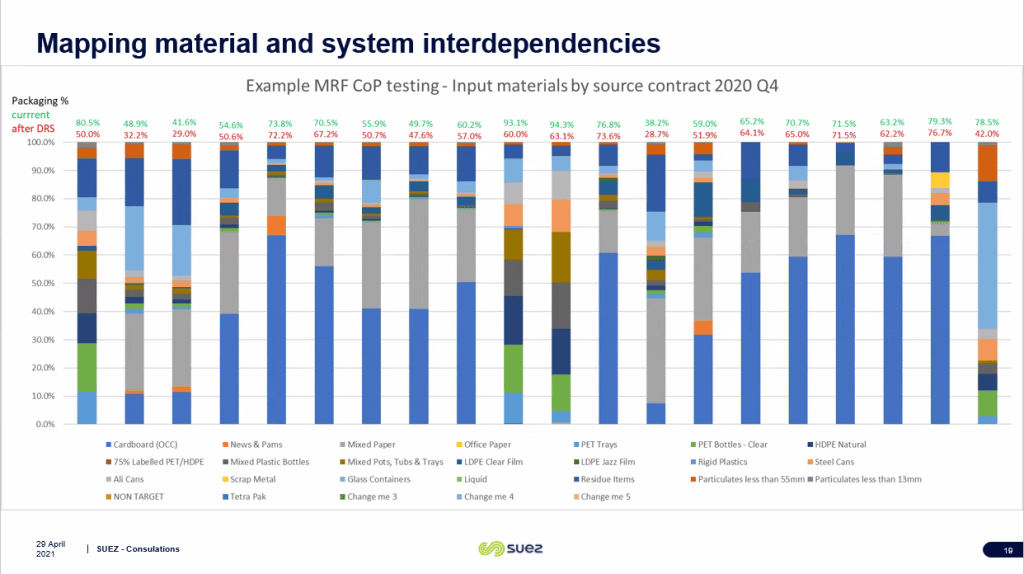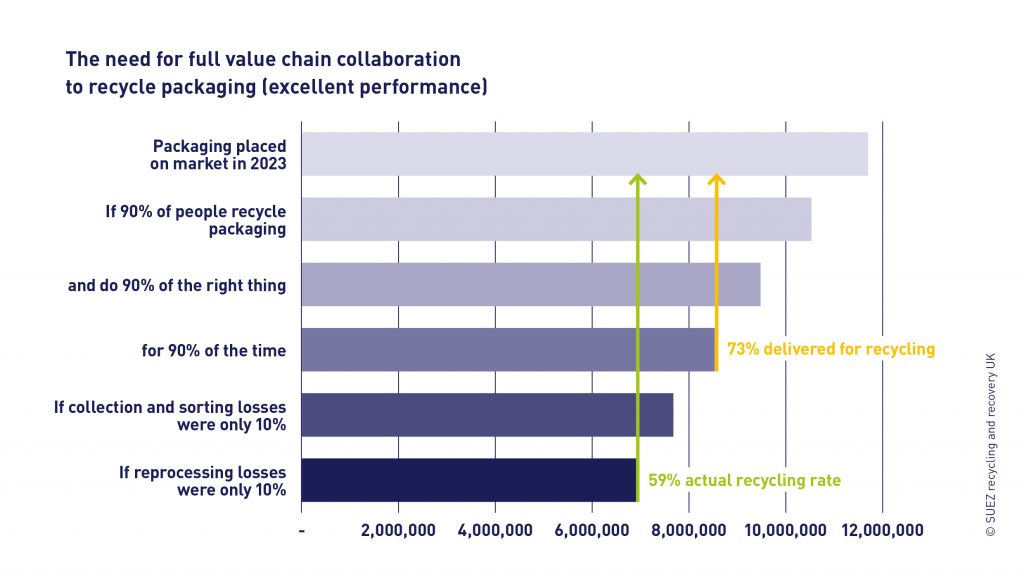Consultations 2021: The fundamental importance of evidence
30th April 2021
Blog by Stuart Hayward-Higham, Technical Development Director at SUEZ recycling and recovery UK.
The first of our deep-dive EPR and DRS discussion workshops with our customers focused on the importance of evidence in the systems being proposed in the recent waste and resources sector consultations from DEFRA. By approaching evidence in a systematic way we were able to translate the data we use today into the new data required to evidence payments, recycling rates and parties in the new systems. Understanding what data is required, from testing at the Points of First Consolidation to geotagging bin collections, to how it will be used, and most importantly that data which comprises ‘statutory evidence’ was an essential component of the session.
By guiding the group through the new system with a mixture of interpretive diagrams and real client data, the true detail of the proposed system was revealed. Questions under consideration included: how to determine payments for collection; sorting and treatment of items obligated under Extended Producer Responsibility (EPR); how payments for reaching or exceeding recycling targets might work; and, what evidence will be needed to ensure payments for residual waste collection, transport and treatment services are paid. And with each of these payments likely to require six, seven, or more data points to enable municipalities or business customers to claim their reimbursements, the need for quality data, robust data capture, and appropriate data management systems were debated.
Data you should have
In order to gain further insight concerning the additional data which may be required in the future, it is key to fully interrogate and understand the data currently available. For a number it was a surprise just how much data was already collected and therefore available. By analysing composition data, for example, you can gain insight to the volumes that may be removed or subjected to the proposed Deposit Return Scheme (DRS), or available for EPR payments in the new system. This process also reveals the potential volumes of other materials that may require collection and treatment with no financial support through the new system – paper, food and green / garden wastes etc. Having been able to share composition data for current waste and recycling feedstocks through one of the SUEZ materials recycling facilities (MRFs), and illustrated the point by demonstrating the scale of current material volumes that would fall under the proposed Deposit Return Scheme (DRS), overlaying this with forecast volumes that would remain under the new system. For some material streams, there was a reduction by as much as 35%, but this varied depending on the material volumes being collected currently. If your collection contains 30% or 60% of obligated EPR packaging it will have a significant impact on costs that can be claimed under the cost recovery system.

Figure 1 Graph shows pre and post DRS materials streams from different customers
Municipalities will also be required to evidence the volume of packaging within their residual waste, as with food and green waste recycling streams, in order to prove composition and support any payment requests. Although not proposed to be part of the CORE requirements for collection, compostable and digestible packaging in food and green wastes were highlighted as some of the critical data points that may not currently exist, but would be required under the proposed system if these types of packaging were being recycled in these facilities. Evidence of actual service costs including collection, transfer station costs, overheads, logistics, maintenance, and treatment are among the evidence required to support any full cost recovery payments. A number of the workshop attendees understandably had questions at this point regarding the material flows into their energy-from-waste facilities, for example, and how and when to measure composition, with the onus being on the contractor or incumbent service provider to deliver this composition data along with cost data.
With the application of the Minimum Acceptable Quality Standard (MAQS), there were questions as to whether some dry recycling, recovered from their Mechanical biological treatment (MBT) process would be acceptable and therefore qualify.
Data you don’t have
With the proposals in the consultations and expectations of digital waste tracking, some concerns were raised by the attendees about how to collect the data, the cost of doing so and the reporting required. The EPR consultation certainty suggests that data generation and reporting are allowable costs, but it’s not completely clear whether some would be required for digital waste tracking and therefore not uniquely for EPR. Concerns were raised with regard to the quality and quantity of packaging collected from households and how citizen engagement and performance is the responsibility of all (local government, national government, producers/retailers and waste contractors), and whether this is reflected in the EPR proposal. The SUEZ ‘five 90’s ’ approach certainly demonstrates how citizen performance is critical to success if we are to increase recycling rates, and the collaboration required in order to communicate to this key audience is not fully explored in the consultation.

When discussing how we evidence the cost of collection for packaging materials, it was recognised that a further degree of complexity exists, namely that some items in the proposed ‘core materials’ may not be collected in the current system, but may be part of the payment system ultimately, if the Scheme Administrator moves from the modelled payment method to the Actual payment method. By calculating the current volume of obligated packaging in the wastes you handle you can ascertain the potential burden and therefore collection costs associated with collecting those materials. However, the complexity of two-tier authorities also needs to be managed.
Where to start your consultation response
We must all keep a focus on the principles of an efficient service, one where costs for all are appropriate to ‘get the job done’ and that we don’t impart unnecessary costs on any part of the system.
So, where to start? Start by understanding the needs of the data of the future and mapping it against the data you have today. Don’t forget to include elements of new data or data reporting that will come through the digital waste tracking proposals. Understand what your data tells you and apply that knowledge to the future. Use the resource and waste policy calculator tool to help – it’s free to download.
SUEZ is actively working with our customers, suppliers and wider network to help promote discussion and exchange that gives all parties the opportunity to provide informed, considered and complete responses to the consultations. We firmly believe that it is only through a united and holistic approach will the proposed future systems actively take the sector forward, towards a more circular economy and a greener recovery.
Visit our website for more details on the workshops and webinars in this series.
Tweet